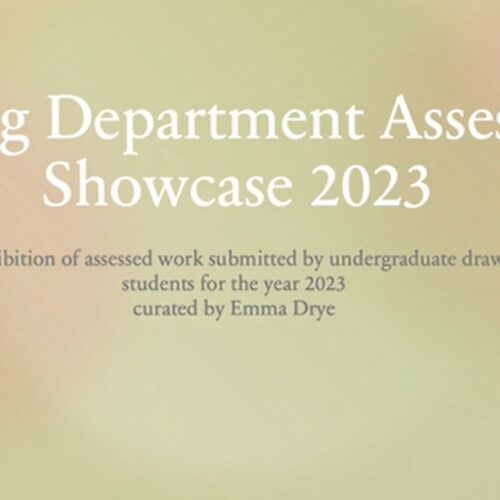
Critique, Criticism (and Social Media)
Imagine if the next feedback from your tutor simply said ‘great’ or ‘I like it all, carry on’. I’m betting that you wouldn’t quite know what to do or how to progress. It’s your tutor’s job to give praise and encouragement but also to point out areas that need addressing. Feedback given by your tutor is an extended critique of your work and of your approach to learning.
You are also required to reflect critically on your work and to critique the work of others. But what does that really mean? It’s a complex subject with lots of nuance, but I hope that this blogpost can help you understand why it’s important to think and express yourself critically; to get the most out of speaking and writing about your work and that of others, especially in the era of social media.
The OCA encourages you to interact meaningfully with your peers and to discuss the work you produce. This might take place in person at a study visit or in a ‘virtual’ space such as the OCA forums but, increasingly, social media spaces like Facebook and Instagram are being used as arenas to display and discuss work and while it can be difficult to express complex and subtle opinions in such spaces, it is worth trying. You’ll be helping yourself and your fellow students.
Definition
The root of the word ‘critic’ is Greek and it means ‘discerning, capable of judging’. This is a really useful thing to remember as the ‘quality of outcome’ element of the mark you’re given at the end of a course is related to such ‘discernment’.
How to critique
Thinking critically about work — whether it’s yours or another’s — doesn’t simply mean ‘criticising’ it in the commonplace sense of the word. ‘Criticising’ implies a wholly negative thing to do and it is not useful. A useful ‘critique’ ought to be a mixture of opinion, knowledge, and ideas. Just liking — or not liking — something isn’t very helpful, as we’ve seen. But saying why something is effective or moving might be. I encourage students to move through opinion to arrive at something deeper when reflecting on their work in their Learning Logs. Rather than stopping at ‘I loved that exercise!’, it’s worth exploring what made it so enjoyable. Writing instead, ‘I loved that exercise because it gave me a chance to really explore how different colours and media interacted’ or ‘I loved how the charcoal moved across the paper and how I could — at last — get a solid black that I didn’t seem able to achieve with pencil’ is much more useful. It captures something specific that you might otherwise not notice and comments like this will help your tutor write feedback that is more personal.
You can apply the same principle when commenting on someone else’s work. Don’t just hit ‘like’ or write ‘love it!’, move through those thoughts and explain what you love or like about the work. Be specific. It might be the composition / colour / scale / use of negative space / the use of line / texture or it might be to do with the piece’s simplicity or the ambition the maker has exhibited. It may even relate to the way they’ve tackled an exercise in a new and interesting way. The beauty of making an observation like this means you can then discuss what might not be working while not ‘criticising’ the work as a whole.
You can also ask questions to prompt a response from the maker. Ask how they came to make something in that particular way, or what the difficulties were. That ought to make them think about the experience which should help them to develop a more nuanced reflection on the process. This, as I’m sure you’ve realised, can generate a conversation around a piece of work that has the potential to be ongoing. When I studied I had two or three close friends whose opinion I valued and trusted and we had endless conversations that spiralled out from discussions relating to specific works. Some of those conversations are still going on.
Another useful strategy is to talk about what the work evokes, or reminds you of. If it’s another artist’s work, don’t accuse the maker of plagiarism as it might be a deliberate attempt on their part to try out a style. The artist you’re thinking of might not be known to the other student, so mentioning them might help them contextualise their work.
A note about social media
Showing your work on OCA Forums or other social media might be a great way to show the world what you’ve done, but it’s important to remember that getting loads of ‘likes’ from other students, family, and friends can have a downside. It can make it difficult to take on board comments from a tutor that are more complex or guarded in their praise. Remember that tutors want you to learn and succeed. To do that, it’s crucial that they keep pushing you, no matter how impressive your work might be.
It’s important to mention that, in addition to national and international law, each social media platform is governed by their own rules and practices. Be sensitive to those practices. Also, the OCA has no jurisdiction in non-OCA forums and in any case, this content is hidden from tutors and support staff.
In summary, getting used to giving and receiving complex rather than simplistic feedback is important. However good your work is, there is always work to be done. When looking at the work of other students you can help them identify things that they may have overlooked by thinking critically about it and by expressing yourself clearly.
Be generous. The more you give away, the more you get back.
Image Credit: OCA student Neil Parker.
|
|







‘Another lovely piece of work’ was when I asked for a change of tutor! I absolutely agree that the more you give, the more you get back and participation is creative fuel.
A useful post thank you Bryan. For me trying to find the way to express something extra about a piece of art can sometimes be challenging but is in the end worthwhile for both me and I hope the receiver. Sometimes also one avoids making any comment because of a fear of sounding silly, or not getting the right meaning. So it is not always easy and as we work mainly digitally, after all we are in a distance learning environment, it is often easier to look and not comment. Sorry about the ramble!
Asking for clarification is a good way to start a conversation, though. Another way to find a way into something that intrigues, but perhaps baffles, is to ask how the work began: ‘what made you start doing it in this way?’
Thanks for this Bryan. I’m fortunate in having a support network that can provide the kind of feedback you’re writing about, but your post is very timely in view of the fact that the number of actual and virtual groups and hangouts is increasing for OCA students.
I sometimes wonder if using a different word could take away that negative perception of critique – even a phrase like “response and feedback”.
That could work, but it removes an important linguistic link to ‘criticality’. I didn’t go into that in the blogpost, but it’s the next step. We can critique work, but work — critical work — can critique the world, too. It might also critique the form in which it works. Picasso and Braque’s ‘High Cubist’ works critiqued painting while being paintings.
Thank you for the post Byran – been talking about effective criticism is so many feedback reports recently so this is great resource to bookmark. The social media section is an important statement – friends/family and those on social media are often very hesitant to question work and only work to reinforce a student preconceptions.
It takes a while to get to understand what the language of the tutor’s criticism really means for your own work. To start with there is a disparity in language use between any two humans. Also if something you’ve done works but you need to move on/develop it, understanding how is the tricky bit. Looking at critiques of others work is really helpful as you are far less emotionally involved and it makes you think twice about your own. I also like the idea of starting with the question of how/why someone chose to work in a certain way or choose a particular subject.
Another great post from you, Bryan. You’re good at not just addressing issues which seem spot on, but laying it all out in a delightfully understandable way (given that this is the art world we’re talking about).
Thanks. I always start from the art world being part of the world and not separate from it. Here’s an analogy that I’ve started using to help explain the idea of reflecting critically on work. Assessing a work of art is, in principle, no different from how we might critically reflect on a restaurant or a football player. People make nuanced judgements about these things all the time, usually when chatting to others. We may prefer the desserts at one place to another, but concede that the price of a third place may make it a more attractive prospect even if the service isn’t so good. One footballer might be quick, but another might be more skilful but a third may work harder or be selfless. Transfer this technique to an analysis of art and we might love Egon Schiele’s use of line but balk at how he treats his subject matter and think the Kathe Köllwitz makes more emotional work. We might acknowledge that but call her ‘sentimental’ when compard with Schiele. And so on.
Thanks Bryan, that was a very useful piece. I think it is important to remember that for critiquing to be valid it needs to be criteria-linked and this is where I think OCA totally succeeds .Of course no two humans use language exactly alike, as you say, but agreed criteria can take some of the ambiguity out of this, and also help cut subjectivity.
I’ve learnt to treat any feedback as information, and as such it has all been helpful – with one exception: I had a tutor whose first words to me were ‘I suspect you of being a Mac user …’. Quite how that was thought to be relevant or helpful I don’t know. I asked to change. All well since.